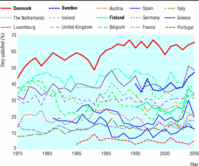| Tuesday, January 23, 2007 |
| Lowered expectations |
 If one has trouble getting everything done that one thinks one ought to get done, one possibility is always that one could lower one's expectations and go for less. If one has trouble getting everything done that one thinks one ought to get done, one possibility is always that one could lower one's expectations and go for less.
I have trouble with that myself, which is why I mention it. I tend towards being a perfectionist, but that sometimes means that I'll try to do something that is too ambitious, and to do it all myself, without noticing I don't have time. And then maybe I'll end up not really finishing the project I had in mind. Which is not good for one's self-confidence, and a bit of a waste of time. Whereas, if one downscales one's expectations, one might be more likely to fulfill them, actually delivering a good product, feeling good about that, and having time left over. Something that is finished in time and that is useful, even if in modest ways, is often more valuable than something that would have been fantastic, but which was a year late, or which never actually happened. There's also the 80/20 principle. If you have a project to do, do the easiest 80% first and get it out the door. Quite possibly if will be sufficient. If the remaining 20% turn out to be needed, do the easiest 80% of that and get it out the door. There are a lot of things that are hard or time-consuming to do, which might not really be needed. One of my jobs is being a programmer. Like most programmers I'm an optimist, so I think things can be done much faster than they really can. I really need a business manager who triples all my estimates of anything, without telling me. That's about the ratio of it. Things usually take 2.5 times as long as I imagined, so that would leave time to finish early and make a profit. You make different decisions if you add more constraints or you lower the expectation of what can be accomplished, and that is sometimes good. If I need some piece of software next month, I might foolishly start programming it myself from scratch, without checking out if anything like it exists, and without properly estimating the work involved. If I know I need it tomorrow, I'd recognize that it isn't possible, and I might find something close enough on the net and install it and be done in a couple of hours. And I'd save a lot of time and headaches. One of my other professions is being a therapist. I've seen a lot of clients who were depressed because they were too ambitious. You have a burning desire to be a millionaire, win an academy award, or play major league baseball? That's great. But if you expect it to happen tomorrow, and you look at your life today, and you notice that you're nowhere near close, you might decide you've failed. Which is silly, of course, but a very human thing to do. The way of getting there is to place a realistic target in the future, and work backwards from there, seeing what you'd need to do before, and before that, etc. And you might end up with that tomorrow it would be a good idea to buy a book in the bookstore, or to make a phone call, as a first step towards going where you want to go. And when you've done that, you might actually be happy that you've taken a step towards your dream. Lowered expectations in the short term might be a way of actually arriving where you want to go, rather than giving up. And then there's the subject of failure. If you plan for always succeeding, you can be pretty sure you'll get disappointed. And if you drop your plan the moment you fail at something, even worse. As has been repeated many times about famous people who've succeeded at something great, they've usually tried and failed many times before getting there. You know, Edison and the light bulb. Thousands of attempts before he got one to work. So, you might as well plan for failure. Visualize that you're probably going to fail in some of the things you're doing, but that you'll continue towards where you want to go. Then there's nothing to be depressed about when you fail. Just one of the steps in the plan. Nothing to worry about. There are some key nuances there. Don't get me wrong. You wouldn't visualize failure as your ultimate destination. You'd be prepared for failing a few times on the way there. Likewise, don't lower your goals in life to something small and safe. Aim high and stay the course. But lower your expectation of how much you'll accomplish at a time, or how good a response you'll get to it, or how well different plans will work. Be prepared that everything might be several times more complicated and difficult than you imagine, but do it anyway. And then you might discover that you actually arrive ahead of time, without being out of breath. [ Patterns | 2007-01-23 14:44 | 1 comment | PermaLink ] More > |
| Danish Happiness |
 I had read about the study before, but a mention at BoingBoing, and a comment by Gunter makes me look at it again. I had read about the study before, but a mention at BoingBoing, and a comment by Gunter makes me look at it again.
Studies show that in Europe, the Danes are by far the people most satisfied with life. The Danish football triumph of 1992 has had a lasting impact. This victory arguably provided the biggest boost to the Danish psyche since the protracted history of Danish setbacks began with defeat in England in 1066, followed by the loss of Sweden, Norway, Northern Germany, the Danish West Indies, and Iceland. The satisfaction of the Danes, however, began well before 1992, albeit at a more moderate level. The key factor that explains this and that differentiates Danes from Swedes and Finns seems to be that Danes have consistently low (and indubitably realistic) expectations for the year to come. Year after year they are pleasantly surprised to find that not everything is getting more rotten in the state of Denmark.Despite being from Denmark, I'd kind of never have guessed it. Danes complain a lot, about the weather, the government, each other. But at the same time, they do really spend a lot of their life having a very cozy time. Danes tend to be a bit emotionally unavailable, but at the same time there's a certain warmth there which is unique. I never thought of it as Danes being happy, but I suppose one can see it that way. The researchers obviously had a hard time figuring out why the Danes in particular are content. They came up with stuff like: Food — Meals in Denmark can be politely described as unmemorable. "Danish cuisine" is an oxymoron, except perhaps the open faced "butter breads" that accompany the beer and aquavit Danes consume for lunch. Older Danes satisfy their hunger with potatoes, gravy, and a bit of pork, and younger ones devour hotdogs, hamburgers, and Baltic-style pizzas. Danish cuisine has some similarities with food from Switzerland and Austria, the second and third happiest nations according to the World Map of Happiness; this suggests that the consumption of comfort foods may be important for life satisfaction.  Eh, that's entirely possible. How about another glass of snaps? And, hey, I take offense to the remarks about Danish food. Unmemorable!?! The Danes love it, and I sure miss the food. Eh, that's entirely possible. How about another glass of snaps? And, hey, I take offense to the remarks about Danish food. Unmemorable!?! The Danes love it, and I sure miss the food.
The part about low expectations might indeed be a key. Danes aren't very patriotic and don't have any ambitious agenda as far as their role in the world. Denmark is a small country and it hasn't been any kind of superpower for a very long time. And being ambitious tends to be socially frowned upon in Denmark. "Don't come here thinking you're anything special", is sort of a hidden Danish attitude. There's even a name for it, the unwritten "Jante Law", which says that if anybody tries to stand out in any way, everybody else will knock them down to size. So, Danes don't expect much. Which means they don't have much to be disappointed about. Indeed, Danes are rarely disappointed. Which in a roundabout way might add up to contentment or even happiness. But if I should add a factor which they didn't mention, it is that Denmark is a free country, in the sense that you can say whatever you want, and there's very relaxed standards in terms of morals and vices and freedom of expression. It is not for nothing that it was in Denmark that porn first was legalized. Danes typically have no hangups in that regard. The age of sexual consent is 15. There's no age for when you legally can drink or smoke, or whatever. There are no words you can't say on TV. There's no censorship. Thus, there's an absence of the moral mind control you find in many other countries. In comparison, Sweden is a much more controlled society where the government will regulate what part of the cigarette you're supposed to smoke, and you can only buy alcohol in government owned stores. In this regard Denmark is very comparable to the Netherlands, which indeed is number 2 on that chart there. I'd say that's a big factor. Danes are quite free to be themselves and do what they enjoy doing, which ought to produce some kind of contentment. [ Culture | 2007-01-23 16:13 | 14 comments | PermaLink ] More > |